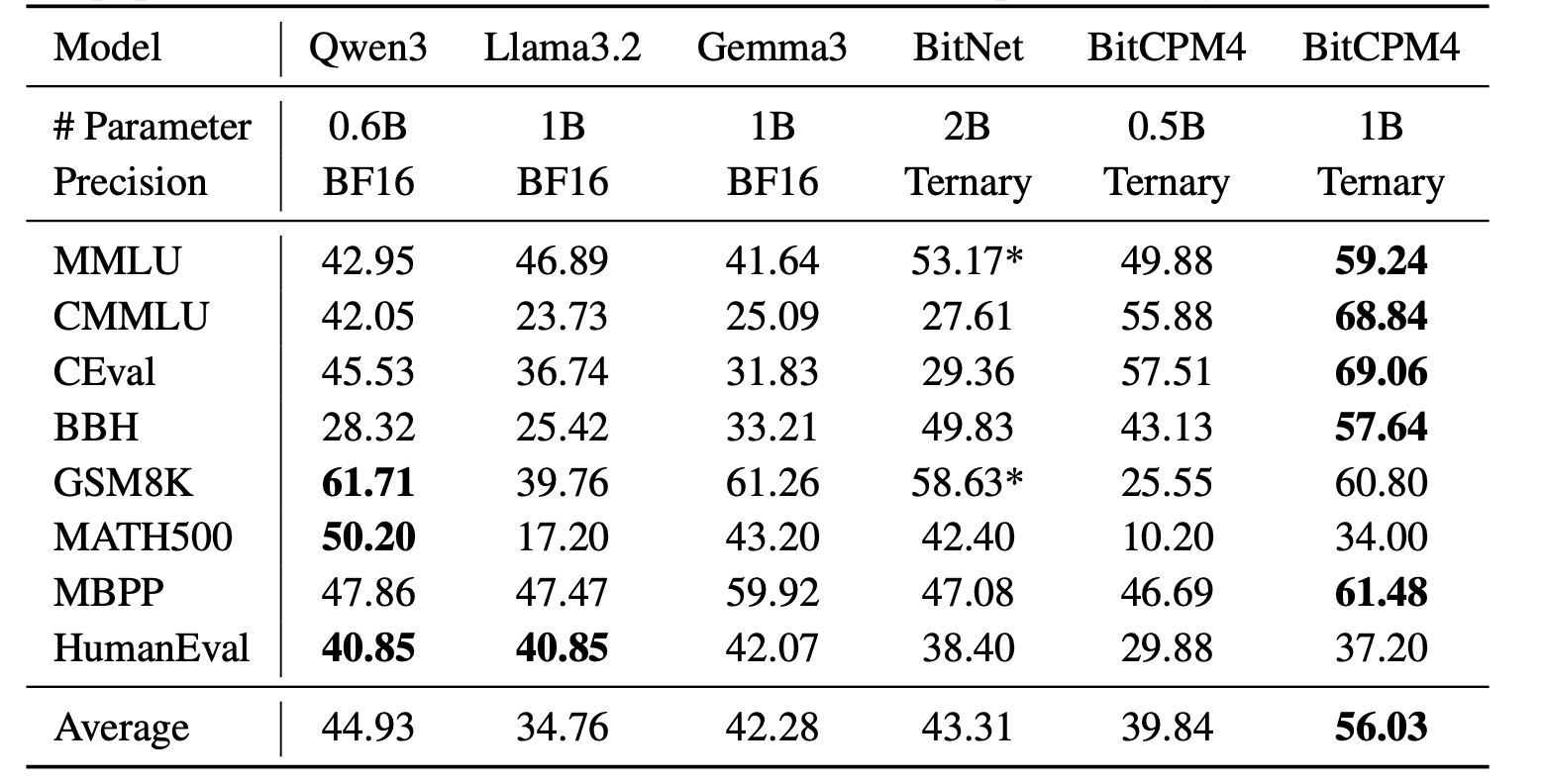# BitCPM4-1B
**Repository Path**: hf-models/BitCPM4-1B
## Basic Information
- **Project Name**: BitCPM4-1B
- **Description**: Mirror of https://huggingface.co/openbmb/BitCPM4-1B
- **Primary Language**: Unknown
- **License**: Not specified
- **Default Branch**: main
- **Homepage**: None
- **GVP Project**: No
## Statistics
- **Stars**: 0
- **Forks**: 0
- **Created**: 2025-06-07
- **Last Updated**: 2025-06-15
## Categories & Tags
**Categories**: Uncategorized
**Tags**: None
## README
---
license: apache-2.0
language:
- zh
- en
pipeline_tag: text-generation
library_name: transformers
---
GitHub Repo |
Technical Report
👋 Join us on Discord and WeChat
## What's New
- [2025.06.06] **MiniCPM4** series are released! This model achieves ultimate efficiency improvements while maintaining optimal performance at the same scale! It can achieve over 5x generation acceleration on typical end-side chips! You can find technical report [here](https://github.com/OpenBMB/MiniCPM/tree/main/report/MiniCPM_4_Technical_Report.pdf).🔥🔥🔥
## MiniCPM4 Series
MiniCPM4 series are highly efficient large language models (LLMs) designed explicitly for end-side devices, which achieves this efficiency through systematic innovation in four key dimensions: model architecture, training data, training algorithms, and inference systems.
- [MiniCPM4-8B](https://huggingface.co/openbmb/MiniCPM4-8B): The flagship of MiniCPM4, with 8B parameters, trained on 8T tokens.
- [MiniCPM4-0.5B](https://huggingface.co/openbmb/MiniCPM4-0.5B): The small version of MiniCPM4, with 0.5B parameters, trained on 1T tokens.
- [MiniCPM4-8B-Eagle-FRSpec](https://huggingface.co/openbmb/MiniCPM4-8B-Eagle-FRSpec): Eagle head for FRSpec, accelerating speculative inference for MiniCPM4-8B.
- [MiniCPM4-8B-Eagle-FRSpec-QAT-cpmcu](https://huggingface.co/openbmb/MiniCPM4-8B-Eagle-FRSpec-QAT-cpmcu): Eagle head trained with QAT for FRSpec, efficiently integrate speculation and quantization to achieve ultra acceleration for MiniCPM4-8B.
- [MiniCPM4-8B-Eagle-vLLM](https://huggingface.co/openbmb/MiniCPM4-8B-Eagle-vLLM): Eagle head in vLLM format, accelerating speculative inference for MiniCPM4-8B.
- [MiniCPM4-8B-marlin-Eagle-vLLM](https://huggingface.co/openbmb/MiniCPM4-8B-marlin-Eagle-vLLM): Quantized Eagle head for vLLM format, accelerating speculative inference for MiniCPM4-8B.
- [BitCPM4-0.5B](https://huggingface.co/openbmb/BitCPM4-0.5B): Extreme ternary quantization applied to MiniCPM4-0.5B compresses model parameters into ternary values, achieving a 90% reduction in bit width.
- [BitCPM4-1B](https://huggingface.co/openbmb/BitCPM4-1B): Extreme ternary quantization applied to MiniCPM3-1B compresses model parameters into ternary values, achieving a 90% reduction in bit width. (**<-- you are here**)
- [MiniCPM4-Survey](https://huggingface.co/openbmb/MiniCPM4-Survey): Based on MiniCPM4-8B, accepts users' quiries as input and autonomously generate trustworthy, long-form survey papers.
- [MiniCPM4-MCP](https://huggingface.co/openbmb/MiniCPM4-MCP): Based on MiniCPM4-8B, accepts users' queries and available MCP tools as input and autonomously calls relevant MCP tools to satisfy users' requirements.
## Introduction
BitCPM4 are ternary quantized models derived from the MiniCPM series models through quantization-aware training (QAT), achieving significant improvements in both training efficiency and model parameter efficiency.
- Improvements of the training method
- Searching hyperparameters with a wind-tunnel on a small model.
- Using a two-stage training method: training in high-precision first and then QAT, making the best of the trained high-precision models and significantly reducing the computational resources required for the QAT phase.
- High parameter efficiency
- Achieving comparable performance to full-precision models of similar parameter models with a bit width of only 1.58 bits, demonstrating high parameter efficiency.
## Usage
### Inference with Transformers
BitCPM4's parameters are stored in a fake-quantized format, which supports direct inference within the Huggingface framework.
```
from transformers import AutoModelForCausalLM, AutoTokenizer
import torch
path = "openbmb/BitCPM4-1B"
device = "cuda"
tokenizer = AutoTokenizer.from_pretrained(path, trust_remote_code=True)
model = AutoModelForCausalLM.from_pretrained(path, torch_dtype=torch.bfloat16, device_map=device, trust_remote_code=True)
messages = [
{"role": "user", "content": "推荐5个北京的景点。"},
]
model_inputs = tokenizer.apply_chat_template(messages, return_tensors="pt", add_generation_prompt=True).to(device)
model_outputs = model.generate(
model_inputs,
max_new_tokens=1024,
top_p=0.7,
temperature=0.7
)
output_token_ids = [
model_outputs[i][len(model_inputs[i]):] for i in range(len(model_inputs))
]
responses = tokenizer.batch_decode(output_token_ids, skip_special_tokens=True)[0]
print(responses)
```
## Evaluation Results
BitCPM4's performance is comparable with other full-precision models in same model size.

## Statement
- As a language model, MiniCPM generates content by learning from a vast amount of text.
- However, it does not possess the ability to comprehend or express personal opinions or value judgments.
- Any content generated by MiniCPM does not represent the viewpoints or positions of the model developers.
- Therefore, when using content generated by MiniCPM, users should take full responsibility for evaluating and verifying it on their own.
## LICENSE
- This repository and MiniCPM models are released under the [Apache-2.0](https://github.com/OpenBMB/MiniCPM/blob/main/LICENSE) License.
## Citation
- Please cite our [paper](https://github.com/OpenBMB/MiniCPM/tree/main/report/MiniCPM_4_Technical_Report.pdf) if you find our work valuable.
```bibtex
@article{minicpm4,
title={{MiniCPM4}: Ultra-Efficient LLMs on End Devices},
author={MiniCPM Team},
year={2025}
}
``` 
